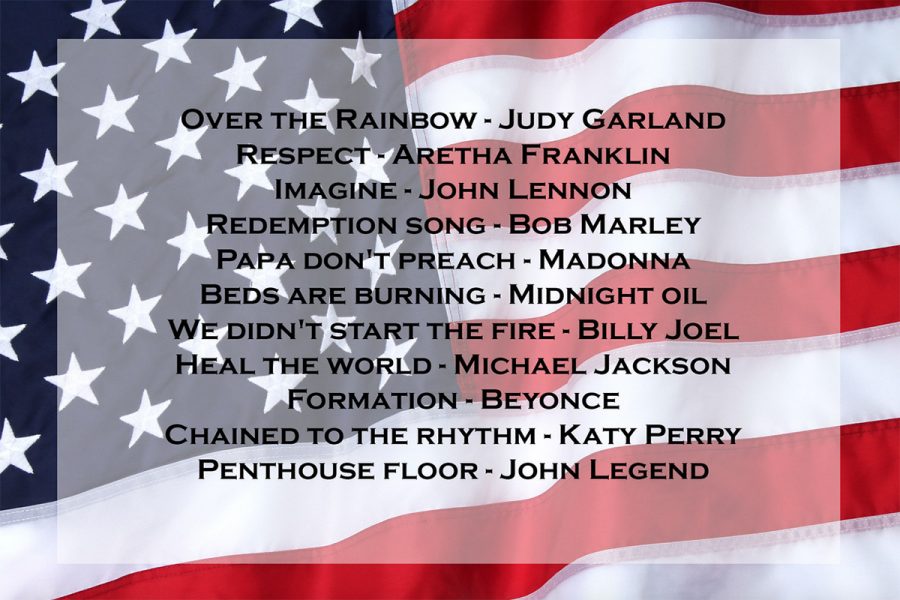The power of music
Photo by Kaitlyn Gordon
February 7, 2018
Music is influenced by many factors from love, jealousy, hate, politics and expressing the views of a person. Music is universal and can be used to spread messages from one person to another, spanning genres and artists alike.
1) “Over the Rainbow” by Judy Garland
The song was released as part of “The Wizard of Oz” soundtrack in 1939, almost being cut from the soundtrack and movie because of its political undertones. The song features a hope for America under President Franklin’s New Deal during the Great Depression. “Over the Rainbow” alludes to a better place and society. The song went on to win Oscars and multiple awards when accompanied by “The Wizard of Oz.”
2) “R.E.S.P.E.C.T.” by Aretha Franklin
This song was released in 1967 and expressed views of injustice and oppression against women. Franklin states that all she wants is a little respect, which could help women everywhere relate to her and what she wants. The song won many awards and was an achievement for women everywhere.
3) “Imagine” by John Lennon
The song, written in 1971, was composed for the purpose of imagining a world without war, borders or religion. Although controversial when it came out, the song ended up earning $2 million. The song was not only inspired by Lennon’s own political views, but also by his partner, Yoko Ono’s “Grapefruit,” a collection of poetry which alluded to wartime in Japan.
4) “Redemption Song” by Bob Marley
“Redemption Song” was written in 1980, soon after Marley was diagnosed with cancer. It appeals to a broken society and a cry against tyranny. Along with these themes, it features Marley’s faith and religious beliefs being altered. In addition to its many political influences, a Jamaican beat and pronoun usage was added in, as well.
5) “Papa Don’t Preach” by Madonna
The song, released in 1986, featured anti-abortion views. Madonna said that it was a way for her to stand up against patriarchal views and male authority. The song was very controversial once it hit the charts, but Madonna was adamant in her views and said in response to the controversy, “‘Papa Don’t Preach’ is a message song that everyone is going to take the wrong way.”
6) “Beds Are Burning” by Midnight Oil
The song is about Australia giving stolen land back to Pintupi tribes who were forcibly removed from their lands. The members not only expressed their political views lyrically, but also physically. During a performance in front of Prime Minister John Howard and a billion people, band members Martin Rotsey, Peter Garrett, Peter Gifford, Rob Hirst, Jim Moginie, Dwayne Hillman and Andrew James wore all black and wrote “I’m Sorry” on their bodies to show the prime minister’s refusal to apologize to the tribes that were treated unfairly.
7) “We Didn’t Start the Fire” by Billy Joel
Starting from 1949, the song chronicles major people and political, social and cultural events from then on. Joel started with 1949 because that was his birth year, and he wanted to show through the song that no matter what era or time it is in the world, it will always be chaotic and crazy. Because of the time Billy started with, the song also demonstrated how his childhood was shrouded with war and violence and a constant fear that the end of the world was nearing.
8) “Heal the World” by Michael Jackson
“Heal the World” is about religious, social, ethnic, cultural and political tolerance along with acceptance. The song was written in 1991 by Jackson himself. The lyrics suggest a happier world could be achieved by accepting people as they are and living harmoniously. This song became the name of Jackson’s charity, established in 1992 to help children in multiple types of situations.
9 ) “Formation” by Beyonce
This song has multiple political messages and views and was released in 2016. Not only are the lyrics politically influenced, but visual aspects as well. In this video, there is a sinking police car and trailers surrounded by water from flooding. This is a reference to Hurricane Katrina, which occurred along the coast of New Orleans. Viewers also see MLK magazines and signs saying, “Stop shooting us,” which is a reference to Black Lives Matter and racial injustice. Also included is the formation of women, a nod to feminism and female empowerment, especially among black women. Lyrically, black women are told to accept and embrace their heritage, especially their natural features like their hair and noses. This song was the first to be written of the album, which then set the tone and theme for the rest of it.
10) “Chained to the Rhythm” by Katy Perry
This song appeals to society as a whole, asking to let go of such rigid, black-and-white beliefs and become more open-minded to others. Perry claims we are all chained to the rhythm of conformity. The song features a reggae beat and Skip Marley, the grandson of Bob Marley.
11) “Penthouse Floor” by John Legend
This song is about the marginalized communities being held back by the elite. “The song is talking from the perspective of someone who lives on the wrong side of town and is invisible to the powers that be,” Legend said. He discusses how the only time people notice the person’s neighborhood is when there’s “a police shooting and protesting in the streets.” It’s a reaction to housing segregation and the subjection of certain communities to ghettoization— the ignorance of poverty and despair in certain neighborhoods. In this song, Legend wants to convey that people only notice others when something dramatic is happening and ignore them during other times.
Overall, these songs were not only influenced by current issues and politics at the time they came out, but they also made an impact on the issues they were written about. While most songs listed above were extremely controversial, they were written for an important reason. The power of music influences and speaks to nations as a whole. Music unites all of us and allows powerful messages to be portrayed and demonstrated through lyrics, imagery and visuals.
















